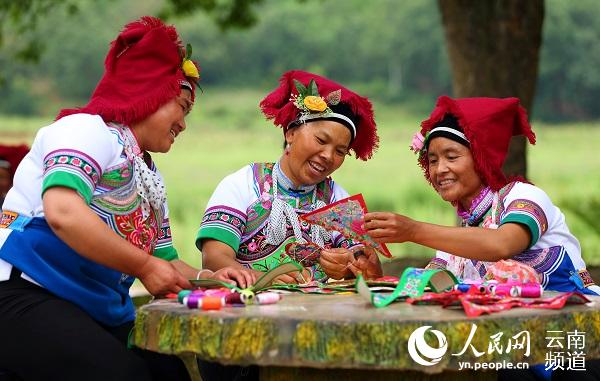


Wang and members of her embroidery cooperative. (Photo: yn.people.cn)
Wang Lufen has developed her childhood skill of making embroidery into a prospering career, bolstered by a booming industry that helps local women shake off poverty.
As an ethnic Yi woman, Wang, a villager from Baishapo Village in Yanshan County, southwest China’s Yunnan province, learned embroidery from her mother and grandmother when she was a child.
With a population of more than eight million, most Yi people live in the southwestern provinces of Yunnan, Sichuan, and Guizhou, and are famous for colorful clothes and decorations. Yi embroidery has a long history dating back over 2,000 years and in 2008 was listed as an intangible national cultural heritage.
In 2012, Wang and 15 other embroidery craftswomen under the guidance of the local government visited other Yi ethnic areas in the province. She was impressed by the development of embroidery industry in these places and was determined to do the same.
Wang is a pioneer of a Yi embroidery association of 36 women was founded in Yanshan County. She has brought the group’s works to various exhibitions around the country and improved their skills and standards according to market needs.
In 2014, Wang’s embroidery association with help from the local government developed into a cooperative, which now has over 1,000 members. Wang has taught the craft to many local women over the years, enabling them to make a living and lift their family out of poverty.
Li Xiaomin, a member of Wang’s cooperative from a poverty-stricken family, is one of them. Wang and other members have encouraged Li and taught her how to do embroidery. She now has a monthly income of 3,000 yuan ($443) that has helped her family move into a new house.
Over 160 women from 120 families in the cooperative are like Li, who used to live below the poverty line. Now each of them can earn 2,000-5,000 yuan each month thanks to their work at the cooperative.
Over the years, Wang and her group have diversified their works to include not only traditional bags and shoes, but also ethnic-style decorations for homes and vehicles to reach more customers. They also built their own Yi embroidery brand and created logo for their pieces to protect ethnic culture.
The village is now experiencing an e-commerce model of private customization, which attempts to combine design, production, and sales, allowing customers to find personal embroidery craftswoman. Their works have been sold to major Chinese cities including Beijing, Shanghai, Guangzhou, Chongqing, and Hong Kong.
In 2018, sales of the cooperative hit 10 million yuan ($1.48 million) and about half a million of the items were purchased online.
“I hope that more village women can join us, to carry on our tradition and live a better life without leaving their homes,” Wang said.
 Fire brigade in Shanghai holds group wedding
Fire brigade in Shanghai holds group wedding Tourists enjoy ice sculptures in Datan Town, north China
Tourists enjoy ice sculptures in Datan Town, north China Sunset scenery of Dayan Pagoda in Xi'an
Sunset scenery of Dayan Pagoda in Xi'an Tourists have fun at scenic spot in Nanlong Town, NW China
Tourists have fun at scenic spot in Nanlong Town, NW China Harbin attracts tourists by making best use of ice in winter
Harbin attracts tourists by making best use of ice in winter In pics: FIS Alpine Ski Women's World Cup Slalom
In pics: FIS Alpine Ski Women's World Cup Slalom Black-necked cranes rest at reservoir in Lhunzhub County, Lhasa
Black-necked cranes rest at reservoir in Lhunzhub County, Lhasa China's FAST telescope will be available to foreign scientists in April
China's FAST telescope will be available to foreign scientists in April "She power" plays indispensable role in poverty alleviation
"She power" plays indispensable role in poverty alleviation Top 10 world news events of People's Daily in 2020
Top 10 world news events of People's Daily in 2020 Top 10 China news events of People's Daily in 2020
Top 10 China news events of People's Daily in 2020 Top 10 media buzzwords of 2020
Top 10 media buzzwords of 2020 Year-ender:10 major tourism stories of 2020
Year-ender:10 major tourism stories of 2020 No interference in Venezuelan issues
No interference in Venezuelan issues
 Biz prepares for trade spat
Biz prepares for trade spat
 Broadcasting Continent
Broadcasting Continent Australia wins Chinese CEOs as US loses
Australia wins Chinese CEOs as US loses